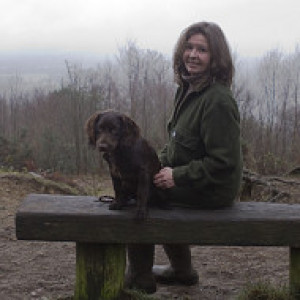Tilly Whim Caves
Heather and I met with Peter and Carolyn at Durlston Castle. I hadn't been in since its refit and was very impressed. The new restaurant The Seventh Wave, with glass panels displaying the English and Latin names of species past and present found around Durlston, was a very modern but pleasant find.
Living in overpopulated Surrey, where the wildlife suffers and what there is left tends to hide from view, I can't help feeling envious for a place where the environment is still intact and far more appreciated. Despite being a major attraction Durlston is still home today for an amazing variety of resident wildlife counting into thousands of diverse species. The day was bright but chilly, bringing many to walk in the country park, but wildlife was visible all around. My dogs were not impressed at being kept so strictly to leads but, unused to cliff edges, I wasn't going to risk them going close. In Greek mythology, Maera threw herself over a cliff and I am determined my Maera will not suffer the fate of her namesake.
We walked down to the Tilly Whim Caves. Portland limestone was mainly extracted in the 18th century, by quarrymen, known as Tillys. Many an expert stone mason used nothing more punches, hammers and wedges to forge horizontally into the cliff and a valuable layer of Freestone. They often worked the stone in situ to produce building blocks and other stone items. Small boats would wait in the waters below for these to be loaded with the aid of cranes called whims. These were then transferred to larger ships which lay at anchor off shore and away from the danger of the rocks.
Much of the stone was used to build fortifications along the south coast but after the Napoleonic Wars the demand slumped and the caves became used more often by smugglers than stonemasons. An entrance was blasted into caves in 1857 and they were opened as a visitor attraction to Durlston Estate. Rockfalls eventually made access too dangerous so the caves were closed permanently to the public in 1976. Today they are a haven for roosting bats and the cliff face a valuable nesting site for seabirds.
Back to the house and preparations for the evening. We were joined by Peter and Carolyn and a few other locals for a superb meal, to which everyone contributed. All was washed down with plenty of good wine that made our competitive game of Scrabble memorable. Not having a dictionary in the house made for all the more fun as we all argued the existence, or not, of words of very dubious nature.
- 1
- 0
- Canon EOS 7D
- 1/100
- f/16.0
- 24mm
- 200

Comments
Sign in or get an account to comment.


